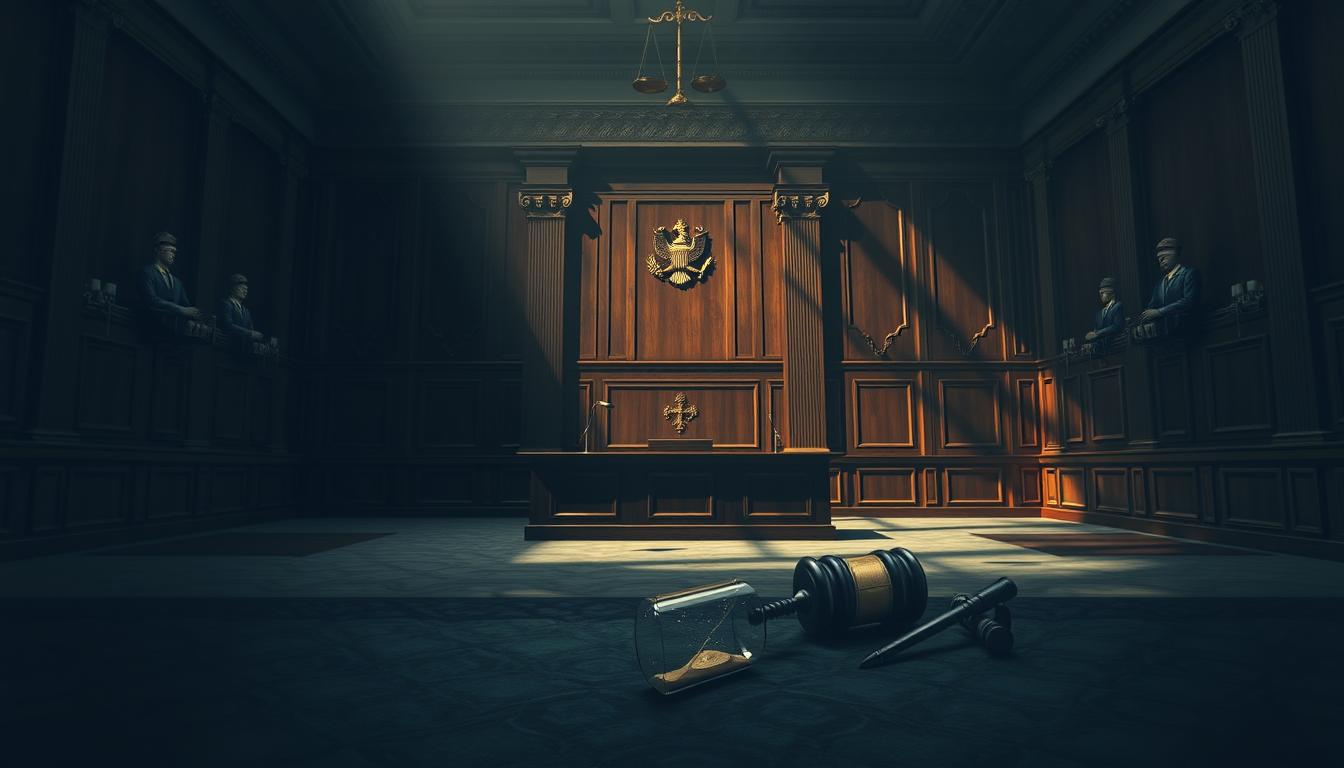The question of what makes laws has long puzzled scholars. The quote “it is not wisdom but authority that makes a law,” by t – tymoff, offers insight. It shows how power and influence shape legal systems.
This section will look at the history of legal authority. We’ll explore how wisdom and power mix in law-making. Tymoff’s words make us think deeply about these issues. Knowing where legal authority comes from helps us understand our legal world better.

Key Takeaways
- The quote “it is not wisdom but authority that makes a law” highlights the tension between moral wisdom and institutional power in shaping laws.
- Legal authority has historical origins rooted in ancient power structures and the evolution of civilizations.
- The distribution of power and the role of authority in law-making have significant implications for the development and implementation of modern laws.
- Understanding the balance between wisdom and authority is crucial for a deeper understanding of jurisprudence and its impact on society.
- Challenging traditional notions of legal authority and the role of wisdom in law-making is essential for addressing the evolving needs of a changing world.
The Historical Origins of Legal Authority vs. Wisdom
The idea of legal authority goes back to ancient times. It shows how legal authority and traditional wisdom have changed over time. This change has shaped how we understand laws today.
Ancient Legal Systems and Their Power Structures
In the earliest ancient laws, power was very centralized. Kings, emperors, and religious leaders controlled laws. They made laws to keep their power and serve their interests.
The Hammurabi Code from ancient Babylon is a great example. It was made in the 18th century BCE. It showed the power of the ruler and was meant to keep society in order.
Evolution of Legal Authority Through Civilizations
As societies grew, so did the way laws were made. Democracy and people’s power changed the old ways. Now, traditional wisdom plays a bigger role in making laws. This includes hearing from more people and valuing their opinions.
Philosophers like Plato and Aristotle helped understand law and justice better. Their ideas helped balance legal authority and wisdom in making laws.
Traditional Wisdom in Law-Making
Traditional wisdom has always been important in law-making. People like indigenous communities and religious scholars have shared valuable insights. These insights have shaped local laws.
Today, we see the value of traditional wisdom more than ever. As we face new challenges, using different perspectives is key. It helps make laws that truly serve the people.
| Ancient Legal Systems | Traditional Wisdom |
|---|---|
| Hammurabi Code (18th century BCE) | Indigenous community knowledge |
| Absolute power of ruling monarchs | Religious and community elders’ insights |
| Laws to maintain social order and power structures | Incorporation into local and regional legal frameworks |
Understanding the Quote: It Is Not Wisdom But Authority That Makes a Law. t – tymoff
Tymoff’s quote makes us think about the role of authority versus wisdom in law. It challenges our view on how laws are made and enforced. It’s about the power structures and who decides what becomes law.
Tymoff says it’s not wisdom or moral reasoning that makes a law. It’s the power and authority in the legal system. This shows the gap between justice and how laws are actually made and enforced.
“It is not wisdom but authority that makes a law.”
This quote highlights the complex relationship between legal philosophy, power, and authority in law. It shows that the most logical or ethical ideas may not become law. It points out the big role that those with legal authority play in the Tymoff quote analysis.
Exploring this quote helps us understand the dynamics of modern legal systems. It sheds light on the ongoing debate between authority and wisdom in making laws.
| Perspective | Explanation |
|---|---|
| Authority-Driven Law | Laws are created and enforced based on the power and influence of those in positions of legal authority, rather than on the inherent wisdom or moral reasoning behind the legislation. |
| Wisdom-Based Law | Laws should be rooted in ethical principles, logical reasoning, and a deep understanding of societal needs, with authority being a secondary factor in the law-making process. |
Tymoff’s quote encourages us to think deeply about the balance between authority and wisdom in law. It makes us consider how laws affect our societies.
The Role of Power Dynamics in Legal Systems
The legal world is complex, shaped by power dynamics. At its core, we see the balance between institutional authority and distribution of power. Knowing these dynamics is key to understanding our laws.
Institutional Authority in Law-Making
Different institutions, like the legislative, executive, and judicial, have a big role in making laws. The legal power dynamics between them affect the balance of power. This, in turn, shapes legal decisions.
Power Distribution in Modern Legal Frameworks
In today’s legal world, power distribution is always changing. Debates over who should have more authority are common. The balance between checks and balances and the influence of special interest groups also play a big role in shaping laws.
Impact of Authority on Legal Decisions
The institutional authority in our legal system greatly influences legal decisions. The way power is used, the biases of those in power, and the power structures all affect the outcomes. These outcomes shape our society.
| Factor | Impact on Legal Decisions |
|---|---|
| Institutional Hierarchy | The positioning of power within the legal system determines the weight and influence of different entities in the decision-making process. |
| Political Affiliations | The political leanings of those in positions of legal authority can sway the interpretation and application of laws. |
| Special Interest Lobbying | The ability of influential groups to exert pressure on lawmakers and judicial officials can shape the legal outcomes. |
Understanding the power dynamics in our legal system helps us see how laws are shaped. This knowledge is crucial for creating a fair and just legal system. It helps us navigate the complex world of law and advocate for change.
How Legislative Authority Shapes Modern Laws
The legislative process is complex and involves many stakeholders. Each one’s power affects how laws are made today. The way power is shared can change the outcome of laws.
Elected officials, chosen by the people, are key in making new laws. But, lobbyists and special groups also play big roles. They use their power and connections to influence lawmakers, sometimes against the public’s good.
Studies show how certain groups’ power can lead to laws that benefit them more than others. Finding the right balance between power and wisdom in making laws is a big challenge. Lawmakers must deal with the complex world of modern governance.
- Elected officials’ role in shaping modern legislation
- The power dynamics between lawmakers and special interest groups
- Case studies of laws influenced by authority rather than wisdom
- The ongoing struggle to balance wisdom and authority in the legislative process
“The authority of those who govern must be ascertained by the wisdom of those who are governed.” – Thomas Jefferson
Understanding the link between legislative authority and modern legislation is key. We must watch the legislative process closely and see how it affects our society.
The Intersection of Wisdom and Authority in Jurisprudence
The mix of legal power and moral wisdom in law is complex and often discussed. Philosophers have long looked into how power, ethics, and justice work together.
Philosophical Perspectives on Legal Authority
Legal thinkers like John Rawls and Ronald Dworkin have talked about the law’s power and ethics. They say the law needs authority to work well. But this authority should also respect the moral wisdom that guides justice.
Balance Between Moral Wisdom and Legal Power
The meeting of legal philosophy, moral wisdom, and jurisprudence is a fine line. Ethical thoughts must be balanced with the law’s power. Judges, lawmakers, and scholars must find this balance, making sure the law is fair and just.
Justice needs a balance between the law’s power and moral wisdom. By finding this balance, the law can improve. It can serve society better, following the rule of law and respecting human dignity and ethics.
Critical Analysis of Authority-Based Legal Systems
In the world of law, many think authority is key in making and enforcing rules. Yet, looking closely at these systems shows both good and bad sides. It’s important to understand these aspects well.
Authority-based laws bring stability and consistency to a society. They come from a single power source, creating a clear legal framework. This helps keep order and makes it easier for everyone to know what to do.
But, these laws can also have downsides. They might not capture the full picture of real-life issues or the changing needs of society. This gap can make the law seem out of touch with people’s everyday lives.
Considering ethics and different viewpoints in law-making could fix these issues. Adding more wisdom and diverse opinions can make laws more fitting for today’s world. This could lead to laws that truly reflect what communities want and need.

In conclusion, examining authority-based legal systems shows we need a better way to make laws. By finding a balance between authority and wisdom, laws can better meet the needs of our ever-changing society.
The Impact of Legal Authority on Society
The influence of legal authority goes beyond courtrooms and legislative chambers. Laws shaped by power can change our communities deeply. When authority rules over wisdom, the effects can be huge, shaping what we think and do.
Social Consequences of Authority-Driven Laws
Laws made just for power can hurt society a lot. They might not solve complex social issues, causing more problems. This can lead to policies that unfairly affect some groups, making society more divided.
Public Perception of Legal Power
How people see legal power is key to understanding its impact. If they think the law is about power, not wisdom, trust drops. This can make people feel disconnected from their rights and protection.
Also, how we see legal power affects our actions and norms. If we see the law as oppressive, we might not follow it. This can cause social unrest and less unity.
It’s important to understand the effects of laws driven by power. By seeing the harm caused, we can aim for a fairer legal system. We can strive for laws that truly serve everyone’s needs and well-being.
Challenging Traditional Authority in Law-Making
Grassroots movements and civil society play a big role in legal reform. They drive change and shape the law-making process. They often push boundaries and challenge the status quo.
Collective action has led to successful legal reforms. The civil rights movement in the United States and the anti-apartheid struggle in South Africa are examples. When people come together and speak out, they can bring about lasting change.
“The people, and the people alone, are the motive force in the making of world history.” – Mao Zedong
Today, grassroots movements are challenging the legal system in many ways. They use social media, public protests, and legislative advocacy to push for change.
- Activists are pushing for legal reform to address issues like police brutality, income inequality, and climate change.
- Community-based organizations are working to challenge authority and amplify the voices of marginalized groups in the law-making process.
- Citizen-led initiatives are driving grassroots movements that aim to reshape the legal landscape, putting wisdom and justice at the forefront.
The future of law-making depends on citizens challenging traditional authority. By using collective action and wisdom, we can create a more equitable and just legal system.

The Future of Legal Authority in a Changing World
The world is changing, and so are the laws that govern it. Legal power, once held by traditional groups, is now facing new challenges. Technology is playing a big role in this change, bringing both new problems and chances for the law.
Emerging Trends in Legal Power Distribution
Legal power is moving away from old ways and towards more shared decision-making. People and groups are now helping shape laws, not just governments. This change could make laws more fair and reflect the views of more people.
Technology’s Impact on Legal Authority
Technology, like AI and blockchain, is changing how laws are made and enforced. It’s giving more people access to legal help and information. As tech keeps evolving, lawyers and lawmakers need to keep up to stay relevant and respected.
FAQ
What is the significance of the quote “It is not wisdom but authority that makes a law” by Tymoff?
Tymoff’s quote points out that laws often come from power, not wisdom. This makes us think about the balance between power and ethics in making laws.
How have power structures influenced the development of legal authority throughout history?
In the past, power and hierarchy shaped laws. As time went on, power stayed with the rulers. This sometimes ignored wisdom and morals.
What is the role of institutional authority in modern legal systems?
Today, groups like legislatures and courts shape laws. The way power is divided among these groups affects laws. Sometimes, power wins over wisdom.
How do power dynamics influence the legislative process and the creation of modern laws?
Power plays a big role in making laws. Elected officials, lobbyists, and groups with special interests can sway decisions. This can lead to laws based on power, not just wisdom.
What are the potential challenges and consequences of authority-based legal systems?
Systems based on power can face issues. They might not be seen as fair, leading to problems in society. Laws made for power’s sake might not serve everyone’s best interests.
How can the balance between wisdom and authority be achieved in modern jurisprudence?
Finding a balance means considering different views and ethics. It’s about making laws that include everyone’s input. This involves open discussions and a willingness to explore new ideas.
What is the future of legal authority in a changing world?
The future of law will likely see big changes. Technology and shifting public views will influence how laws are made. Balancing old systems with new needs will be key.